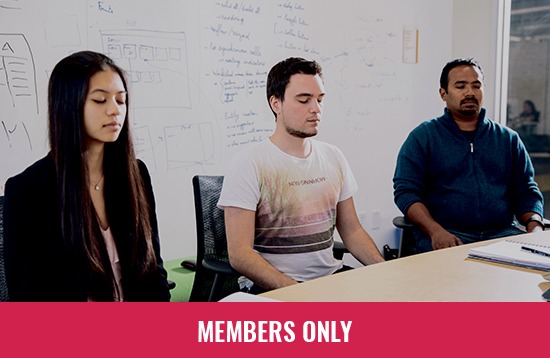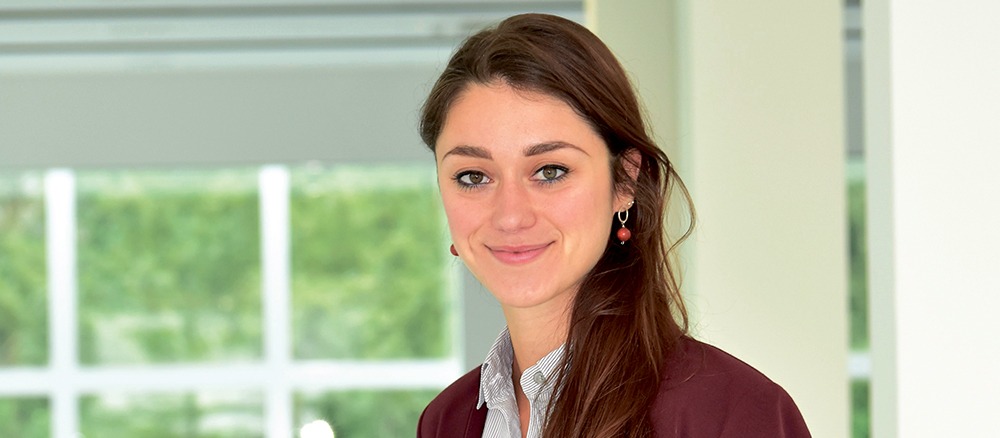
Mit Achtsamkeit den digitalen Wandel meistern

Es geht auch ohne Quote


Dr. Erika Georget, Project Leader Biotechnology at Bühler Group.
The possibility to make an impact
Ms Georget, you are currently working as a project manager at Bühler Group. How did you get there?
I graduated as a Food Process Engineer in France in 2011. Following this, I received the opportunity to join an industry-sponsored graduate research program in Germany. I completed my PhD at the Leibniz Universität Hannover in 2015 and decided to pursue my career in the food industry.
Bühler was one of the companies with which I came in contact through a two day student challenge in Uzwil (Bühler headquarters, Switzerland) in 2014, „From Farm to Fork“. This was an eye-opener for me. The impact Bühler as a company has on the food and feed value chain was astounding to me. After my graduation, I applied for the International Management Trainee Program at Bühler and I got selected. This program was a chance to broaden my research background and gain experience in management. Over these three years, I could work on various projects and different locations within Bühler Group all over the world. I completed the program this year in April and was offered the role of Project Leader Biotechnology in the Corporate Technology team.
Why did you choose Bühler as employer?
This might sound a bit idealistic, but it was really about the chance to make an impact. During my studies and later my PhD, I became aware of the importance of food safety, sustainable processing, and the challenge of food supply to a growing population. At Bühler, I discovered that about two thirds of the grain worldwide passes through our solutions. Two thirds is a huge share, which shows that we reach many people with our solutions, and it does not stop there. 30% of the rice worldwide pass through our technology, as well. Besides the food sector, we are also strong in the automotive industry: About 50% of all newly produced cars have components produced by Bühler machines. Bühler might not be as well-known as other brands that are selling products to end consumers, but we do have a huge reach.
For me, as a process engineer, that means that my work has the potential to make an impact.
This is a big motivation, because I see that my work is meaningful.
What exactly falls into your work area?
Biotechnology can be simplified as the exploitation of biological processes for industrial purposes. Biotechnology and bioprocesses have a lot to do with some of the crops we are processing. Likewise, bioprocesses can also help us to use new biological sources. In my role, I am particularly interested in evaluating new potential sources of nutrients, for instance looking for new sources of proteins. After all, we are facing a significant protein gap. The fact that we need to increase our protein production by 50% until 2050 is quite an intimidating thought, but we are up for the challenge. As an example, we recently launched a new business which is focused on processing insects into a usable protein source for feed applications – this not only significantly reduces the impact on the grain supply chain but also provides a high quality feed source for the animals.
Following this example, I am assessing new opportunities, where Bühler could play a role in the exploitation of new crops to help tackle the food supply challenges we are facing on a global level.
You have taken part in some competitions already. Are you looking for a comparison to other people? Why?
When I started my PhD and was freshly out of my studies, my advisor told me: “Good lab work is essential, but to be successful you also need a great network. You need to go to events and be able to represent our lab and promote our research.” Visibility is critical for a lab in order to attract partners and talents. Applying to these competitions was a way to get to congresses, but even more so an opportunity to promote the lab and the work we were doing. Last but not least, this was a great chance to extend my professional network. It helped me to meet new people and discover new topics, it was a very enriching experience, regardless whether you win or not. Academic research needs a lot of effort, and taking part in such events is a great way to get an external feedback on your work.
You have also won various awards so far. Which acquisitions are you most proud of?
I felt really happy about competing in the Farm to Fork challenge at Bühler. What separates this one from others is the fact that it was a team challenge. In academic competitions, it is often one student standing and representing his/her work and the lab. The Farm to Fork challenge was the first time in my PhD I had the chance to present collective work with a team and to be able to develop it in an area where I had interest, but no experience. The idea was to look at ways of reducing waste and losses along the food chain, which is a subject area I am quite passionate about. When I joined the challenge, there was an online platform where participants could enter ideas. Teams were organized according to similar ideas. Bühler gave us two days of coaching with people from the company who were helping us develop our idea using many assets we would have never had access to otherwise. That, too, was a big difference to classic research competition, where the work is already done when you apply. Here it was all about triggering a topic and working with Bühler experts to draw particular conclusions from it. We then built our final proposal which we presented to the executive board members, again, something unusual and exciting. The whole experience was quite unique and satisfactory.
Do you also experience professional competitive situations? How do you deal with them?
When I consider my experience so far with Bühler, I would not say that you have individual competitiveness. It is more a team of people with various skillsets, working together towards a common goal. We do have competition of course with external companies. To deal with this, we have to be the industry leaders in innovation, quality and customer service. Our strength comes from diverse views and opinions from different people, from different units and with different skills. This output is incorporated to gain the edge with our solutions. To stay competitive, you need an organisation where people can rely on each other to deliver results for Bühler.
So I cannot really say that I have felt a notion of competitiveness between people within the company. When you need help on a project or support, it is quite common for people to simply call regardless of different entities in different parts of the world. What makes Bühler stand out is that we find common ground quickly, support each other and then deploy all our skills for a rewarding project. We do not have internal barriers and we have a lot of in-house knowledge we can capitalize on. This is one of the keys to deal with competition in our sector.
How does the gender distribution / diversity in your work area or industry look like?
Traditionally the machine industry is not the most diverse when it comes to gender. It is a male-dominated sector and Bühler in this sense is no exception. We are aware of the imbalance and initiated a diversity and inclusion initiative to drive change. Our management, and particularly our CEO Stefan Scheiber, are convinced that diverse, gender mixed teams are a competitive advantage. This year, our management pledged publicly to a 1% year-over-year increase in the share of women Bühler employs. For this, a core team has been established which is fostering initiatives to support diversity and inclusion, and improve gender balance.
Do you observe that women handle competitive situations differently than men? If so, what is the difference?
To be honest, I am always cautious when it comes to comparing large groups, women with men for instance.
Whether you take women or men, you already have a lot of diversity within either group.
I worry that when we say “men are more like this” or “women are more like this”, we reduce this complexity to averages, ignoring the actual diversity existing between individuals. There are many different ways to address competitive situations in general, regardless of gender. These ways may be influenced by many other factors, ranging from education, culture, or age to name a few. The social complexity of each individual is difficult to grasp, so I would not want to draw a black or white picture. That being said, in some contexts, certain tendencies can be identified. One example I can think of would be in the context of applying for new positions. Some women tend to be more aware of their area of expertise and are seeking for a full fit, while many men may be more daring and just say “Alright, I match 70%, I’ll get the missing 30% on the fly”. I think that this gap may shrink with seniority and experience, but to encourage taking risks should be part of education early on.
At the end of our interview we would like to take a look into the future: What personal challenges will you be looking forward to over the next five to ten years?
Before looking at the next five to ten years, I need to look at the next day.My focus at the moment is to find opportunities where Bühler could play a role in the exploitation of new and existing resources to help tackle the global food supply challenges, in particular with respect to proteins. Presuming we find a good fit in terms of opportunity size and in line with the company vision, I would love to develop that corresponding business and grow it for the company. This would hopefully bring me to a leadership role, which is one of my goals for the next five to ten years: To have a leadership function in Bühler, ideally being able to drive a business that I started from scratch. You can look for such opportunities, but I think it is amazing if you have the chance to nurture a business opportunity from the discovery and growing it to a new business pillar. There are already some very good examples at Bühler which inspire me, like insects as a source of proteins for feed or our new production process for battery electrode slurry. I would be very excited if I could follow a similar path.
Rubrik
Ausgabe
Dr. Erika Georget
Nationality
French
Profession
Project Leader Biotechnology
Website
buhlergroup.com
Information
Erika Georget graduated as a Food Process Engineer in France in 2011. She completed her PhD at the Leibniz Universität Hannover in 2015 and decided to pursue a career in the food industry. She started working for Bühler in 2015 and took on the role of Project Leader Biotechnology in 2018.

